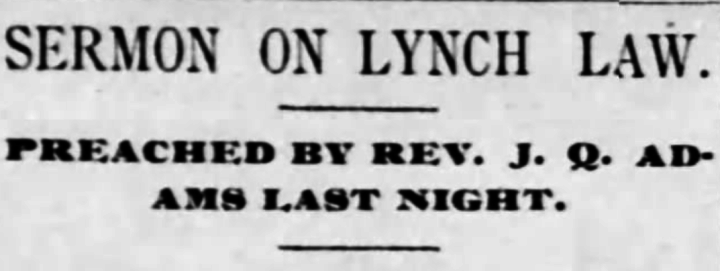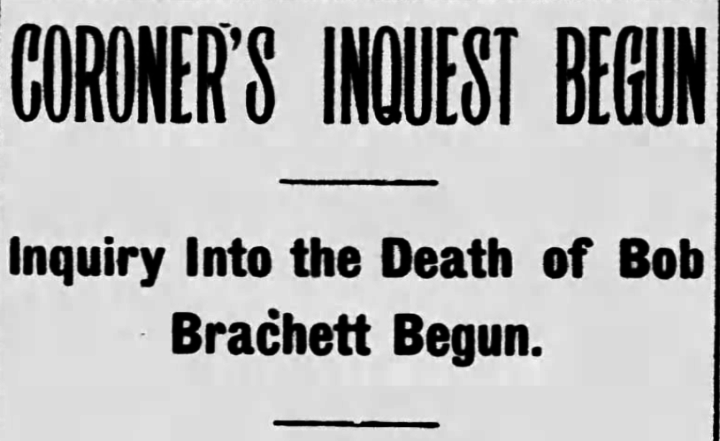On April 26, the the Equal Justice Initiative, a private nonprofit, opened the National Memorial for Peace and Justice in Montgomery, Ala. The memorial features over 800 weathering steel monuments. According to its website, each structure represents a county in the U.S. where a “racial terror lynching” took place. Names of victims are inscribed on each pillar.
The nonprofit has also made a second pair of identical monuments available to all counties named. On its website, the Equal Justice Initiative writes: “Over time, the national memorial will serve as a report on which parts of the country have confronted the truth of this terror and which have not.”
Buncombe is among the 800 counties represented, with three racial terror lynchings recorded between 1877 and 1950. During that same period more than 4,400 African-Americans were murdered across the U.S. In this week’s column we will examine two of the three lynchings that took place in and around Asheville. Both occurred in the 1890s.
The Sept. 25, 1891, evening edition of the Asheville Daily Citizen reported:
“’Twas a ghastly burden which a white-oak on the hill overlooking the French Broad river, south of Smith’s bridge, bore this morning.
Hanging from the lower limb of the tree, was the form of a colored man, left dangling there by a party of men, who, unwilling to give the man a fair and just trial, took the law into their own hands, and his life was made to pay the forfeit for his crime.”
Hezekiah Rankin, an African-American brakeman had been lynched.
According to the paper, Rankin had been involved in a violent dispute with a fellow railroad worker, Fred A. Tyler. The confrontation ended with Tyler, a white man, being fatally shot.
The paper condemned the lynching, to a point. It declared:
“No one had any reason to suppose that Asheville’s criminal court is either indisposed or powerless to inflict just punishment upon all violators of the law, and so long as this is true the law must be maintained and the court upheld.
When the courts fail it will then be time enough to consider whether the lynch law is the next best thing.”
Three days later, the Asheville Daily Citizen spoke with a Rev. J.Q. Adams, who denounced the act. He stated:
“This community has been shocked by the terrible occurrence in this city on Thursday night. And many of the timid have trembled with fear of what might follow. I refer to the lynching of the negro man. I am glad too, to know that the papers of our city have been so prompt in condemning the action of those who took part in the affair. The press of the entire country ought to come out squarely against mob law.”

Adams went on to describe lynch law as “a growing evil” and noted that “[y]ou can scarcely pick up a paper without seeing an account of where a crowd of people have taken the law into their own hands.” Too often, the pastor added, the punishment is “inflicted upon the wrong person.”
Four men would be arrested for the murder of Rankin: Erwin Allison, W.H. Mayo, Tim McCoy and Lum Bolch. But on Nov. 5, 1891, The Weekly Citizen reported that all four of the accused had been released due to insufficient evidence.
The debate around lynching continued. On Dec. 24, 1894, The Citizen featured an article titled “The True Remedy for Lynch Law.” Its author, Walter Clark of Raleigh, declared:
“The cause of lynching is not a spirit of lawlessness. As a rule the men who participate in it wish ardently to enforce justice. The truth is society feels that it must protect itself. Whenever society has lost confidence in the promptness and certainty of punishment by the courts, then when ever an offence sufficiently flagrant is committed, society will protect itself by a lynching. There is the whole story.”
Clark went on to claim trials were no longer about truth, but a matter of “legal skill on the part of the counsel.” He argued “every possible advantage is given to the defendant and every possible disadvantage is imposed on the prosecution.” Without legal reform, Clark maintained lynchings would continue. He wrote:
“The purpose in hanging a man is not to reform him but to deter others. To have that effect the punishment must be prompt and certain whenever guilt is clear beyond all reasonable doubt. This principle which is so often ignored by the courts is the one which instinctively actuates lynching mobs. The principle is in itself right and courts should act upon it and not leave it to be at once as a motive and a plea for the illegal execution of justice.”
Three years later, on Aug. 11, 1897, the Asheville Daily Citizen reported “a sad story of lawlessness.” According to the paper, a mob of men destroyed the Asheville jail in their quest to punish Bob Brachett, a black man who had been arrested the previous day, accused of criminally assaulting Kitty Henderson, a white woman from Weaverville. (Brachett initially denied the claim, before a supposed confession.)

Brachett was not in the jailhouse, but en route to Raleigh. Nevertheless, the article stated:
“For several hours last night a portion of Asheville was in the hands of a howling and tipsy mob, not a cool and determined body of sober men impelled in their action by a laudable impulse and motive. It was bent upon the destruction of something, regardless of what that was. That the object destroyed was inanimate apparently made slight difference.”
The mob would, however, manage to intercept Brachett’s transfer, kidnapping the prisoner from the authorities. The mob lynched Brachett later that evening at Reems Creek. No arrests would be made.
The following day, on Aug. 12, the Asheville Daily Citizen reported on the event. The article stated: “One of the strange sights at the scene of the lynching was to see a number of women walking about, wearing small twigs taken from the tree on which Brachett was hanged.”
Editor’s note: Peculiarities of spelling and punctuation as well as antiquated and offensive language are preserved from the original documents.



Before you comment
The comments section is here to provide a platform for civil dialogue on the issues we face together as a local community. Xpress is committed to offering this platform for all voices, but when the tone of the discussion gets nasty or strays off topic, we believe many people choose not to participate. Xpress editors are determined to moderate comments to ensure a constructive interchange is maintained. All comments judged not to be in keeping with the spirit of civil discourse will be removed and repeat violators will be banned. See here for our terms of service. Thank you for being part of this effort to promote respectful discussion.